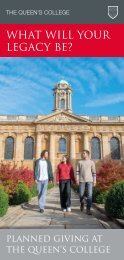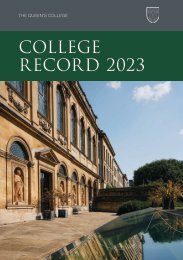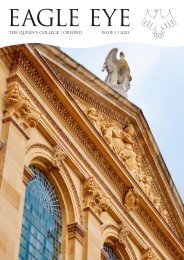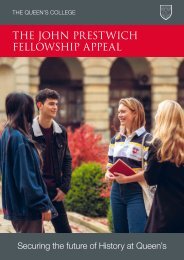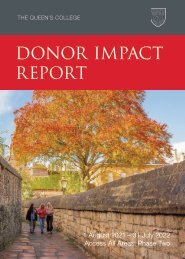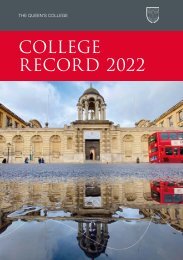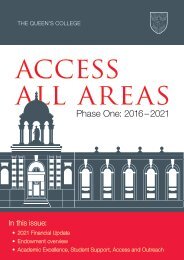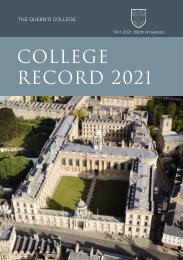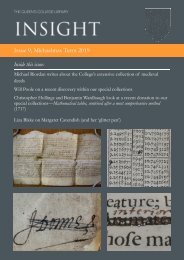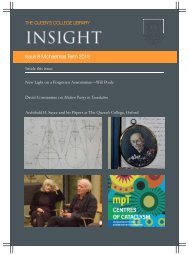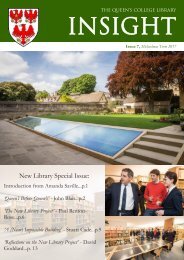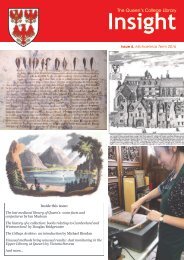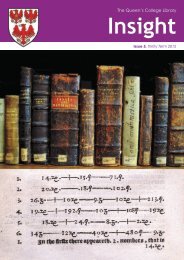The Queen's College Record 2020
You also want an ePaper? Increase the reach of your titles
YUMPU automatically turns print PDFs into web optimized ePapers that Google loves.
Articles<br />
Owen kept the diary for many decades; most entries are only a line or two, and<br />
in some years, he wrote nothing. He recorded a variety of events, particularly the<br />
appointments, promotions and deaths of Queen’s servants. In some cases, this<br />
diary provides the only surviving evidence of the employment of these men and<br />
women. However, Owen offers no comment on his own work. He does not describe<br />
his responsibilities, nor those of his colleagues; there are no details of his working<br />
conditions, nor his satisfaction or dissatisfaction with those arrangements.<br />
Not surprisingly, the most detailed entries usually concern good food. Owen wrote<br />
appreciatively of dinners given by Fellows for the servants. On 29 December 1864<br />
he wrote, ‘All the servants, 26 in number, dined and supped in <strong>College</strong> at Dr.<br />
Farrar’s expense – on the occasion of his leaving Coll. for his new appointment of<br />
Professorship of Eccl. Hist. to Durham University.’ In 1878 Owen noted that, to mark<br />
the event of his election as Provost, Rev. Magrath ‘kindly presented to every servant of<br />
the <strong>College</strong> (33 in number) a fine Turkey for their Christmas-day dinners.’<br />
Unfortunately, William Owen’s diary is silent on the subject of vacation employment.<br />
<strong>The</strong> highly seasonal nature of Oxford’s economy and the problem of precarious<br />
employment were well known at the time. Most servants could expect a significantly<br />
reduced income for approximately half the year; the effects of this were compounded<br />
by servants’ dependence on perquisites and gratuities – which typically comprised<br />
a third to one-half of their remuneration. Year-round employment was guaranteed<br />
only for senior servants; it was not until after the Second World War that conferences<br />
began to provide enough work to keep most servants employed during the vacations.<br />
An article in Jackson’s Oxford Journal provided a clue to the origins of the scheme.<br />
Mayor Thomas Randall described how three years earlier, in 1856, he was struck<br />
by the length of that year’s Vacation, which began in early June, and the difficulties<br />
faced by junior servants particularly, who ‘had to rely only on the little resources they<br />
made during term’. If a young servant was able to save anything, Randall explained,<br />
‘he oftentimes found that at the end of Long Vacation that it was not only gone, but<br />
that he was in debt’. Junior servants did not typically receive a cash wage from the<br />
colleges, relying only on customary tips.<br />
Randall recalled that while travelling in the summers, he was struck by the difficulties<br />
hotels had hiring seasonal waiters, during precisely the same months that many<br />
college servants needed work. Randall approached senior members of the University<br />
in January 1856 to discuss his idea for the scheme, but without much success. He<br />
was disappointed to find a general belief prevailed among those men that ‘it would be<br />
impossible to induce the junior college servants to leave Oxford to obtain employment<br />
until all their money was spent’.<br />
<strong>The</strong>re were few local opportunities for employment in the summers; some servants<br />
looked for agricultural work, hay-making and bringing in the corn. Some colleges<br />
110 <strong>The</strong> Queen’s <strong>College</strong> | <strong>College</strong> <strong>Record</strong> <strong>2020</strong>




